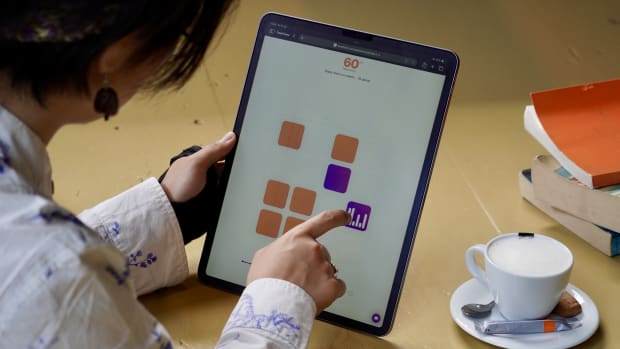
Test your musicality with this online game: “We've all experienced that at a karaoke night”
The Music Cognition Group at the UvA recently presented a new online game called TuneTwins. The game is based on traditional memory, but instead of pictures, participants try to match two similar sounding music clips. The game is designed to investigate how people remember music.
This is not the first time that the Music Cognition Group has released a game. In 2022, the research group launched ToontjeHoger, which tested players’ sense of rhythm and pitch, among other things, and in 2020, Hooked on Music was presented, which studied which elements of a song can make it a hit; what makes a song catchy? However, the latest game, TuneTwins, is all about musical memory. How do different musical elements influence how we listen to music and what we remember?
BaYaka and Chinese folk music
The game is now online and has already been played thousands of times by participants from more than vifty countries, so Folia decided to give it a try. The aim is for the game to be played worldwide, so it not only features Western genres, but music from diverse cultures such as Central African BaYaka music, and traditional Chinese music. This cultural diversity alone makes the game challenging, as becomes apparent when sixteen orange memory cards appear on screen and unfamiliar melodies begin to play.
To even further the challenge, the music fragments that have to be matched are not necessarily identical. The challenge may intensify further: in some cases, half of the musical clips are significantly distorted, making it even more difficult to find the right match. Relief comes when familiar themes from popular TV series such as Succession and It‘s Always Sunny in Philadelphia appear between the BaYaka and Chinese tracks. At least these recognizable melodies give us something to hold onto and boost our confidence. Eventually, after a humbling exercise, we end up at the end of the first round with a total score of 150 points.
Distorted music
A score to write home about? According to project leader Jiaxin Li, it’s nothing to be ashamed about, but if you really want to get a good idea of your own musicality, you should play all twelve levels. “Even you got a much lower score in the first game, there’s nothing to be worried about. The difficulty levels vary and appear in randomized order, so you may encounter an extremely difficult level of game to start with, or an extremely easy one.”

She continues: “People are able to recognise music even when it is distorted. You can recognise Happy Birthday even when someone sings it out of tune; we’ve all experienced that at a karaoke night. But how we do this exactly – what information we use and what cognitive mechanisms make it possible – is not yet fully understood. With the game TuneTwins, we want to discover which aspects of music are most important for our musical memory. In other words: which characteristics of music do we use to remember music and recognise it by ear?”
To answer this question, different elements of the various tunes are altered in the game, explains Li. “We apply varying levels of degradation to different aspects of music to understand which features are most salient to our ears and minds. We expect that degrading an aspect will have a greater impact on performance the more important that aspect is. That’s how we combine science with gaming.”
When asked about what other factors might influence musical memory performance, Li explains that the answer to that question may vary depending on the demographic group. While recent research shows that pitch patterns are particularly important for Western populations, elements such as rhythm and timbre play a greater role in other cultural contexts. “Whether someone already knows a particular piece of music or not is also likely to have an influence, or even age”, says Li.
Universal
The fact that there is still so much to discover on this subject is reason enough for Li’s academic curiosity, but she also believes there are practical applications in healthcare, education, and artificial intelligence. “Music is a universal part of human culture. Even before birth, babies can form memories of music and then, after birth, distinguish between familiar and unfamiliar melodies. People with dementia often retain the ability to remember and enjoy music from their childhood. Research into which characteristics of music the brain prioritises can therefore provide valuable insights into core cognitive mechanisms such as memory and perception. This understanding could illuminate both our evolutionary past—why humans developed music—and guide how we can better utilize music in our lives in the future.”
The Music Cognition Group launched the game this summer at a conference in São Paulo, where, according to Li, it was well received. So now all that remains is for the research group to hope that TuneTwins, now that it is online, will actually prove popular. Li is hopeful: “In 2024, we took the game to the Republic of Congo to work with an indigenous hunter-gatherer community. Despite language and cultural differences, the game proved easy to learn and great fun to play. Even after the initial experiments were completed and we moved on to other research, participants often asked if they could play again. We hope TuneTwins will bring the same joy to players worldwide.”
Curious about your own musicality? Play TuneTwins here.


